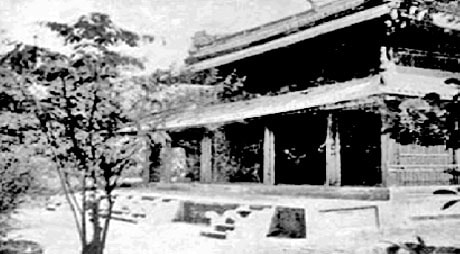A place to store the nation's Han Nom heritage
Under the Nguyen Dynasty, a system of libraries was established to copy and preserve many documents and books of the State. In addition to the National History Institute, the Nguyen Dynasty also established libraries such as the Cabinet Library, also known as Dong Cac, Tu Khue Library, etc. These libraries all contributed significantly to the preservation of many valuable documents of the State that still exist today.
(Baonghean) -Under the Nguyen Dynasty, a system of libraries was established to copy and preserve many documents and books of the State. In addition to the National History Institute, the Nguyen Dynasty also established libraries such as the Cabinet Library, also known as Dong Cac, Tu Khue Library, etc. These libraries all contributed significantly to the preservation of many valuable documents of the State that still exist today.
According to the book "Kham dinh Dai Nam Hoi dien su le", the agencies that store the documents of the Nguyen Dynasty (including royal decrees, various types of documents, books, etc.) are Thi thu vien, Thi chieu vien, Noi han vien, Thuong bao khanh, established from Gia Long first year (1802). The functions of Thi thu vien and Thi chieu vien are to draft, distribute, and keep the royal decrees and documents of the Gia Long Dynasty. Noi han vien looks after the king's private letters, and Thuong buu khanh keeps all kinds of gold and jade seals. In the first year of Minh Mang (1820), the name of Thi thu vien was changed to Van thu phong so that the three institutes Thi thu, Thi han, and Noi han all belonged to that office. In the 10th year of Minh Mang (1829), Van thu phong was changed to Noi cac. In the agencies of the Cabinet, there was the Office of the Secretary (also known as the Office of the Secretary), which, in addition to the function of recording royal decrees and poems, also kept all kinds of court books and official documents for communication with foreign countries and vassal states; the Office of the Minister of the Interior kept the royally approved memorials, namely the minutes and copies of internal and external memorials.
Cabinet Library in 1942.
To store documents in the Cabinet, in 1826, King Minh Mang built a separate house called Dong Cac; located behind Ta Vu. To enter this area, the staff of the Secretariat or the Cabinet who were directly in Dong Cac had to have "Nhap Cac nha bai". Since then, on the upper floor of Dong Cac, there were preserved: All treaties that the Nguyen Dynasty kings signed with foreign countries; diplomatic documents with foreign countries; royal poems and writings; maps; Chau Ban (Chinese documents written on paper approved by the king) of the dynasties.
On the lower floor of the East Pavilion is the Tu Khue Library, established in the 5th year of Tu Duc (1852), with its own staff to keep all kinds of "classics", "history", "philosophy", and "collections", in which most of the Chinese documents were collected by King Minh Mang (the rest are kept in Di Luan Duong. Di Luan Duong is considered a dependent archive to store books and literary works).
From May 2, 1933, King Bao Dai established the Royal Office led by Mr. Pham Quynh to replace the Cabinet. At this point, the Cabinet was officially abolished, after a history of 104 years. Therefore, the Cabinet was abandoned, no one took care of it, there were no doors around it, some parts were leaky, and many of the documents and documents stored there were damaged.
Currently, valuable Han Nom documents in the cabinet have been transferred to the National Archives Center, such as: Nguyen Dynasty's Imperial Records, Nguyen Dynasty's Land Register and many other valuable books and documents are currently stored in major libraries in Hanoi: Library of the Institute of Han Nom Studies, National Library, Library of the Institute of History, Library of the Institute of Social Science Information... These documents and books can be considered an extremely valuable source of historical materials for many scientific fields and are an indispensable part of the nation's Han Nom heritage treasure.
Nguyen Huy Khuyen (Faculty of Oriental Studies - Dalat University, 01 Phu Dong Thien Vuong - Dalat City - Lam Dong)


